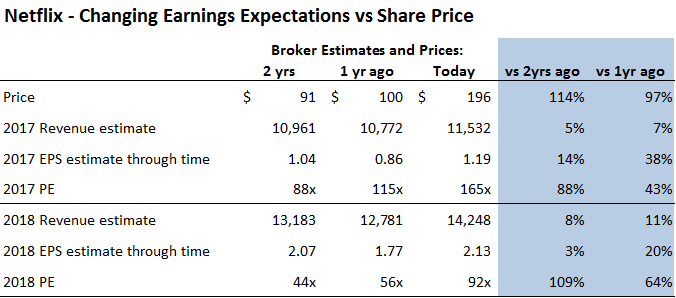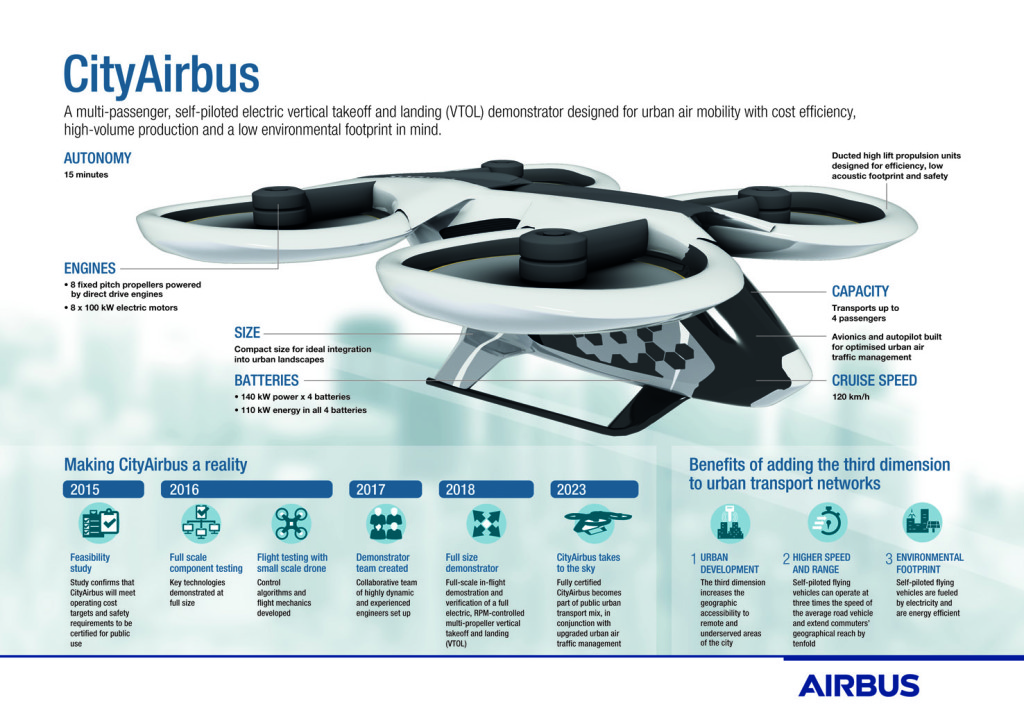This week in tech: Netflix, Amazon and flying taxis
Cable media stocks fell sharply after AT&T announced video subscriber losses, following Comcast and leading to $60 billion being wiped off their valuations. Investors love Netflix but competition is coming. Amazon may move into the $560bn prescription drug market. And more exciting technology developments in transport.
The battle for video
Media habits
The average American spends half a day - every day - consuming media. 12 hours and 1 minute to be precise, according to stats released this week from eMarketer. There is some double counting from multi-tasking, such as surfing Facebook whilst watching TV, but that is still a staggering amount of time. It is also about two hours more than Americans spent a decade ago.
US adults spend 3 hours and 17 minutes per day on their mobile, excluding phone calls. This has increased by more than an hour since 2013, with consumers spending more time viewing videos and gaming.
But regular TV remains the most time-consuming activity at around 4 hours or 33% of time. It is down 7 minutes from 2016, which is not much considering the other demands for attention.
People are watching just as much TV. But how they are watching is changing rapidly, perhaps more rapidly than investors expect as we found out this week.
Consumers defecting from Cable
It was only a month ago that Comcast, the largest US cable company, sounded the first warning. At a Bank of America conference management said that investors can expect the company to lose about 150k subscribers this quarter. Its shares fell 7%. This was shocking news as Comcast, unlike other cable companies, had been gaining subscribers due partly to the popularity of its new Xfinity product. Brokers had expected it to add around 10k subs in the quarter.
The second warning came Thursday when AT&T pre-announced that they are going to lose 390k subscribers in traditional video services. No one was expecting the results to be good - some analysts pegged subscriber losses at up to 300k - but also they weren’t expected to be this bad. Its shares fell 6% and dragged the rest of the cable industry down: Comcast fell another 4%, and Dish, Charter, Altice and Verizon were all down. Investors are worrying that the pace of cord cutting (turning off cable for streaming video) has accelerated.
$60 billion in market cap has been wiped off the value of the American video companies in a month, and almost half of that was on Thursday this week.
To put that $60 billion in perspective Netflix’s market cap is $85 billion. Its US business is only about half of that value or $40 billion. So American video companies have fallen by 1.5x the value of Netflix just in the last month.
Netflix is winning, at least for now, but not by as much as the whole industry is losing.
Netflix raising prices
Given this backdrop with the cable companies it was very interesting that Netflix announced this week it is raising prices from November.
In the US its standard package increased 10% from $10 to $11, and its premium package increased 17% from $12 to $14. In the UK prices increased 7% and 11%. The basic package price will stay the same. Australian customers already had a 16 and 20% price hike on these packages in June.
Last time Netflix raised prices subscriber growth disappointed and the stock tanked.
Streaming TV competition is heating up
- Amazon is the #2 streaming service. It is expected to spend $4.5 billion on video this year, not too far behind Netflix’s $6 billion budget. And as usual Amazon is playing to win, not for profit.
- Hulu, the #3 streaming business after Amazon, chose instead to lower prices this week - dropping its price by 25% to $6 for the plan with ads. Hulu is backed by Disney, Comcast, Fox and Time Warner. This year it bought the rights to 3,000 episodes of TV including many past hits like 30 Rock. Hulu just won the Emmy for best drama series for The Handmaid’s Tale, and has dozens of other projects in the works. (VIEW LINK)
- AT&T launched a streaming competitor, DirecTV Now, about a year ago. This product gained 300k subs in the quarter, largely offsetting its 390k subscribers lost in the core video business. After a year it has around 800k subscribers, growing 60% this quarter alone. AT&T is going all-in on video. It bought DirecTV for $67 billion in July 2015, making it the largest PayTV provider with 26 million subscribers. And it should get approval by the end of the year for the $100 billion acquisition of Time Warner, the owner of HBO. That $167 billion M&A spree is double Netflix’s market value.
- Disney pulled its content from Netflix last month, effective from 2019. Disney is going to launch streaming services for both ESPN (its sports network) and Disney.
- Google’s YouTube and Facebook are both ramping up spending on original content.
How are investor’s views of Netflix changing?
Investor sentiment for Netflix has improved dramatically over the last year, and its share price has doubled.
Netflix’s earnings expectations have also increased with solid subscriber additions and price rises faster than anticipated. Its 2018 EPS estimate is up 20% since last year, though only 3% vs 2 years ago. At 92x next years earnings investors are undoubtedly more focused on subscribers and revenue, with margins to follow. Its 2018 Revenue estimates are up 8% and 11% over 2 years and 1 year. See the chart below.
The prize is big, but therefore so are the stakes. The next few years will see increased rivalry for talent and content, new streaming platforms and the impact of mega-acquistions.
Netflix has the first mover advantage and a great track record of successful productions. The bull case is that Netflix has the best platform globally to monetise content so it can pay more for the best content, and therefore it will become the main producer and distributor of content globally. If this is how it plays out then Netflix is a bargain.
The industry was slow to get started, but competition is coming - and for some it is a fight for survival. The world's biggest, best capitalised and most successful companies are moving in: Amazon, AT&T+DirecTV+Time Warner, Google, Facebook, as well as the traditional suppliers and competitors Disney, Comcast and Fox.
In comparison Netflix needs to fund a negative $2 billion in free cash flow and doesn’t have a cash cow business to lean on.

Amazon’s next disruption
Last Friday CNBC reported that Amazon is in the final stages of figuring out its strategy to get into the prescription drug market. CNBC cited an internal Amazon email that said it will decide before the end of November.
Rumours have been building for months that this is Amazon's next big opportunity - at $560 billion the pharmacy market is too big for it to ignore. Many analysts have written about the logic of this in detail so its hardly a surprise.
Despite the forewarning, investors in the drug retailers were still spooked on the news. Over the last month CVS is down 13%, Walgreens is down 18%, and the financially stressed Rite Aid is down 34%.
And it seems that disrupting one industry a week isn’t enough for Amazon - Bloomberg reported that Amazon is testing a new service that will allow the company to oversee the transport of vendor packages from warehouse to customers’ homes. Some took this to mean that UPS and FedEx will be under threat, though there were a number of denials. Here is a good analysis from Supply Chain Dive: (VIEW LINK)
More Transport Disruption
There has been a lots of interesting news in the transport sector lately, including electric vehicles, autonomous driving, and rocket ships.
Two weeks ago I wrote about Dyson entering the Electric Vehicle market: (VIEW LINK)
Last week I wrote about Google launching a driverless taxi by Christmas and SpaceX using rockets to commute anywhere in the world in under an hour: (VIEW LINK)
This week we have three interesting developments:
Airbus’s Flying Taxi
Airbus confirmed it is looking to launch a full sized demonstration of its flying taxi - CityAirbus - next year, with plans to be operating by 2023. CityAirbus takes off vertically using four rotors, much like recreational drones, and can carry four passengers on short flights in dense urban areas.
Maybe you can fly it to your rocket ship to commute to Paris for the afternoon?
TechCrunch article: (VIEW LINK)

Porsche Mission E and superfast charging
Porsche’s electric vehicle, the Mission E, should be available by the end of 2019. This week Porsche displayed its Cayman e-volution concept car at the EV Symposium in Stuttgart.
More interesting was Porsche’s Turbo Charging system, an 800-volt fast charging system that it claims can charge cars to 80 per cent in just 15 minutes. One is already installed in Berlin, with the next in Atlanta Georgia, and then rolled out across Europe by Audi, BMW, Daimler and Ford in a joint venture.
With 500km range and a network of charging stations that do the job in 15 minutes, maybe range anxiety won't be an issue.

Voyage self-driving taxi deployed - beating Google
Voyage, the autonomous driving spin-off from Udacity, deployed its first self-driving taxi service in a 4,000 resident retirement village in San Jose, California. Residents can summon one of three self-driving cars and travel autonomously around the community. This beats Google to the punch, though it is on private roads in a highly controlled area.
Here is Voyage's press release, and the 2 minute video is worth watching: (VIEW LINK)
Who thought your retired parents were going to ride autonomous taxis first?
12 topics

